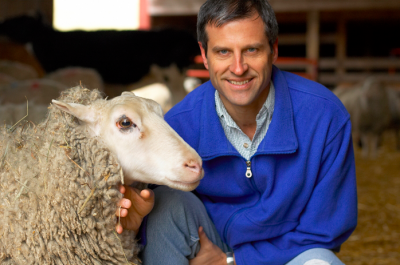You never know when or where you will meet an inspiring food professional. In this case, it was at TEDxManhattan this past January. Gene and Taylor struck up a conversation, having both found themselves in awe of Stephen Ritz' riveting TED talk. Little did Taylor know, at the time, that Gene's work is equally impressive, and at the forefront of both animal advocacy and sustainable food. Which goes to show that humble leaders are hiding all over.
When did you know that you wanted to work in food?
I wasn't specifically focused on working in the food business, but ended up here through efforts to promote kindness to animals and healthful, conscientious living. Our food choices are among the most important decisions we make every day. How we eat profoundly impacts on our own health, as well as the well being of other animals and the natural world. It's important for people to become more educated and to make food choices that better align with their own values and interests. It is great to see people feeling better about themselves, both physically and emotionally, and becoming empowered by eating well.
How did you get your current good food job?
I co-founded Farm Sanctuary in 1986. We started as an all-volunteer organization funded by selling veggie hot dogs at Grateful Dead concerts. Farm Sanctuary has grown and now has hundreds of thousands supporters, and more than 80 staff people, so I'm now able to draw a salary for my work.
How did your previous work or life experience prepare you for a good food job?
I was raised by conservative Catholic parents and grew up wanting to do my part to make the world a better place, especially for 'the least of these.' I came to see animals, particularly those exploited by agribusiness, as among the most abused creatures on the planet, and wanted to help them. I started investigating factory farms in the 1980s and would find living animals discarded like garbage, thrown in trash cans and on piles of dead animals. It was apparent that animals were suffering unconscionably, and abused in ways that most citizens would find appalling. I also saw how this system has a dehumanizing effect on people.
What was the greatest obstacle you had to overcome in pursuing your Good Food Job dream?
The biggest obstacles I've faced involve bad habits that people adopt without thinking about them, and the assumptions and beliefs that bolster them. Humans are social animals, and tend to do what those around them do, even if it's harmful. For example, in the U.S., we grow up eating lots of meat, milk and eggs, and believe this is normal, and even healthy. But, when we look more carefully, this sort of consumption leads to serious problems for our health, and for the planet. It can get frustrating to see the slow rate of progress, but I have never thought of quitting. I believe that people are generally inclined toward and desirous of compassionate, healthful living, and that gives me great hope.
What can you identify as the greatest opportunities in food right now?
We are in the midst of a food revolution. People want to get closer to the source of their food and that's creating enormous entrepreneurial opportunities. As people learn about factory farming, they are looking for alternatives. These range from organizing or participating in farmers markets and community supported agriculture programs, to educational projects that teach people where to find and how to prepare healthful foods. There are opportunities to teach people about edible landscaping and to grow food in innovative ways, including in urban settings (eg. window, rooftop, and/or wall gardens). There are also tourism and community oriented opportunities such as farm tours, or holding educational events or weddings and parties on farms (including urban farms, or community gardens). The possibilities are literally endless.
If you could be compensated for your work with something other than money, what would it be?
I am lucky to be compensated by the feeling that I'm making a positive difference in our world, and I get to enjoy the company of many interesting people and animals. For me, those rewards are far more important than money.
Do you know someone worthy of food-related praise who is too humble to tout their own good work? Tell us about your hero and maybe we can highlight their work right here on the gastrognomes.









